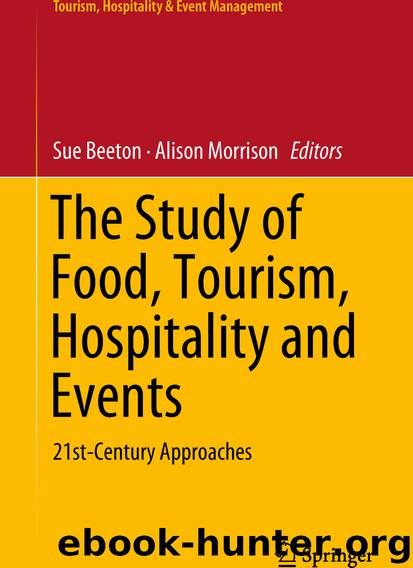The Study of Food, Tourism, Hospitality and Events by Sue Beeton & Alison Morrison

Author:Sue Beeton & Alison Morrison
Language: eng
Format: epub
Publisher: Springer Singapore, Singapore
Literature Review
John Dewey, arguably the father of experiential education philosophy and theory, ‘[took] for granted the soundness of the principle that education in order to accomplish its ends both for the individual learner and for society must be based upon experience’ (Dewey 1938: 89). He saw experience as a transactional continuum between an individual and their environment, in which every experience modifies the person and these modifications affect the quality of the experiences subsequently undergone. This transactional relationship meant for Dewey, that experience is not solely an internal phenomenon; each experience has an active dimension which changes the external conditions under which the experience takes place.
The lack of accounting for this contextual or social dimension of learning is one of the main criticisms levelled at Kolb’s (1984) theory of experiential learning—see for example Elkjaer (2009); Jarvis (2009)—in which he brought together many of Dewey’s ideas with those of Kurt Lewin on action research and the cognitive-developmental work of Jean Piaget—amongst others. In Kolb’s model experiential learning involves a dialectical process of iterative and recursive cycles of immersion in concrete experience, stepping back and reflecting on the meaning of that experience, assimilating it into patterns by a process of abstract conceptualisation, then applying that new knowledge through active experimentation. There are two sets of dialectics in the model: one between experience and abstraction and the other between action and reflection.
These theories of experiential learning underpin efforts to bridge the gap between theoretical and practical aspects of learning and provide the pedagogical foundation for experiential learning opportunities in event management education and training; see for example Lamb (2015) and Moscardo and Norris (2004). Indeed, Robertson et al. (2012) similarly emphasise the importance of supporting the development of practical skills and knowledge though sound educational and pedagogical foundations, including reflection in particular. As they point out, ‘reflection is what changes a mere experience into one that is a learning experience’ (p. 229).
The vital role of reflection on experiential learning is reiterated elsewhere, for example (Lamb 2015; Helyer and Lee 2014), the former of whom cite several other authors in support of the need for reflection to make sense of experiential learning and develop reflective practice. However Robertson et al. (2012), make the point that although much of the literature emphasises the benefits of reflection for student learning, this need may not be appreciated by the industry practitioners providing the work experience. Bladen and Kennell (2014) cited in Lamb (2015) advocate for educators working in partnership with industry to enhance cohesion in achieving the planned outcomes of the course.
The value of providing experiential learning opportunities is well documented. This includes benefits not only for students, but also for staff, the educational institution and industry (Moscardo and Norris 2004; Leslie and Richardson 2000; Busby 2005; Tribe 2002; Walters 2017; Mair et al. 2009). Some of the benefits for students include learning the importance of planning, learning to work as a team, learning from mistakes, and gaining confidence and a sense of achievement (Moscardo and Norris 2004); and gaining communication skills, teamwork, empowerment and again, confidence (Walters 2017).
Download
This site does not store any files on its server. We only index and link to content provided by other sites. Please contact the content providers to delete copyright contents if any and email us, we'll remove relevant links or contents immediately.
Life 3.0: Being Human in the Age of Artificial Intelligence by Tegmark Max(5558)
The Sports Rules Book by Human Kinetics(4388)
The Age of Surveillance Capitalism by Shoshana Zuboff(4293)
ACT Math For Dummies by Zegarelli Mark(4049)
Unlabel: Selling You Without Selling Out by Marc Ecko(3663)
Blood, Sweat, and Pixels by Jason Schreier(3625)
Hidden Persuasion: 33 psychological influence techniques in advertising by Marc Andrews & Matthijs van Leeuwen & Rick van Baaren(3566)
The Pixar Touch by David A. Price(3439)
Bad Pharma by Ben Goldacre(3428)
Urban Outlaw by Magnus Walker(3398)
Project Animal Farm: An Accidental Journey into the Secret World of Farming and the Truth About Our Food by Sonia Faruqi(3221)
Kitchen confidential by Anthony Bourdain(3091)
Brotopia by Emily Chang(3056)
Slugfest by Reed Tucker(3004)
The Content Trap by Bharat Anand(2927)
The Airbnb Story by Leigh Gallagher(2857)
Coffee for One by KJ Fallon(2638)
Smuggler's Cove: Exotic Cocktails, Rum, and the Cult of Tiki by Martin Cate & Rebecca Cate(2541)
Beer is proof God loves us by Charles W. Bamforth(2464)
